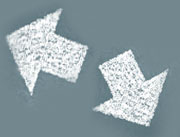Should I or Shouldn’t I?


YES? NO? MAYBE? No one is perfect and sometimes despite everything you’ll make a bad decision. In the perfect scenario the decision-making process goes something like this: You ascertain the goal you want to achieve as well as how important it is to you to achieve it. Then you look at your options and decide which one will help you achieve that goal. It sounds so simple. So what goes wrong?
H e leapt onto the stage and grabbed the microphone from the rabbi. He looked out to the crowd. “Bring me a kippah tzitit tefillin!” he cried. “I’m ready! I’m doing teshuvah!”
She gazed at the rows of salad dressings staring at her defiantly. So many flavors each a different price each with different amounts of sugar calories and preservatives. She felt dizzy. How could she possibly decide?
A major decision made with confidence and determination. And an everyday decision tiny yet paralyzing. Why do people approach the business of decision-making so differently? Are you born either decisive or a procrastinator or is it something you learn? And most importantly can you do anything to change?
How Do We Decide?
To answer all these questions first you need to understand a little about how the brain works. In the relatively new field of “decision neuroscience” researchers are discovering how the actions of neuronal circuits in the brain affect the thousands of decisions you make every day. This sounds frighteningly deterministic. If your thoughts are just a product of brain waves where is your freedom of choice?
There is actually a lot more to it. Research seems to suggest that the brain uses two separate networks to make decisions: one that determines the risk versus the reward of each choice and another that guides how you ultimately behave. And in the gap between these two networks lies your freedom to choose for better or worse. For example when you go shopping the brain’s valuation network may tell you to buy only the salad you need for dinner. But then you spot those delicious knishes. The brain’s second network takes over and suddenly the salad is forgotten and the knishes are in your shopping cart.
Good Enough?
A while back I went shopping on Rabi Akiva Street in Bnei Brak with my bechor for a black suit for his bar mitzvah. I thought it would be easy — how hard can it be to find a black suit after all? I was wrong. Oh so wrong. I hadn’t realized that my beloved son was one of those people who have to check out every single black suit in every shop along the entire length of the street (and Rabi Akiva is a very looooooong street) before coming to a decision. I am not like that. If I find a decent black suit at a decent price I don’t feel the need to view every other black suit in the country before buying it.

These different approaches to shopping — and decision-making — have official names. Apparently I’m a “satisficer” a term coined by economist Herbert Simon in 1956. This is a type of decision-making that “prioritizes an adequate solution over an optimal solution.” Translated this simply means that “satisficers” will choose something that is “good enough ” even though better options may be out there. That doesn’t mean they choose poor-quality items only that once they’ve found what they’re looking for they’re satisfied.
In contrast “maximizers” — like my son — want to make the best possible decision. That means that even if they find a black suit (or anything else) that fits their requirements they can’t make a decision until after they’ve examined every option (i.e. every single black suit in Bnei Brak) so they know they’re making the best possible choice.
Of course some of us may be satisficers most of the time but when something is particularly important we may find we have a maximizer side too. Yet generally most of us most of the time fall into one category or the other. (Excerpted from Family First Issue 548)
Oops! We could not locate your form.







